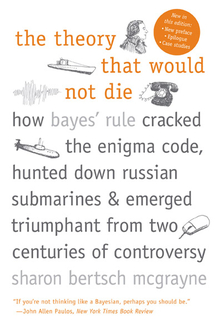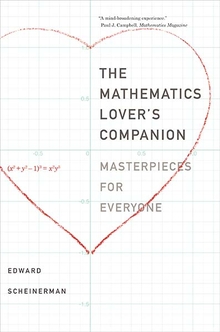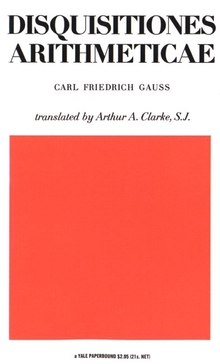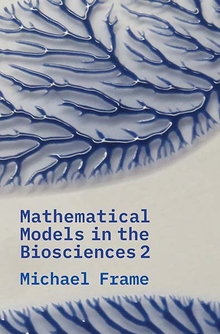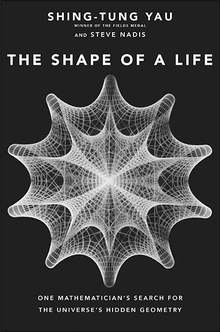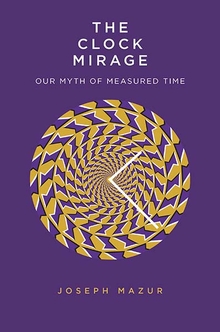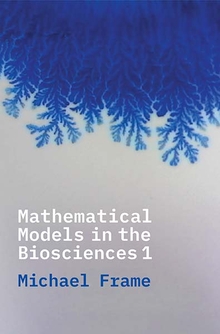The Theory That Would Not Die
WARNING
You are viewing an older version of the Yalebooks website. Please visit out new website with more updated information and a better user experience: https://www.yalebooks.com
How Bayes' Rule Cracked the Enigma Code, Hunted Down Russian Submarines, and Emerged Triumphant from Two Centuries of Controversy
Sharon Bertsch McGrayne
A New York Times Book Review Editor's Choice: A vivid account of the generations-long dispute over Bayes' rule, one of the greatest breakthroughs in the history of applied mathematics and statistics
"An intellectual romp touching on, among other topics, military ingenuity, the origins of modern epidemiology, and the theological foundation of modern mathematics."—Michael Washburn, Boston Globe
"To have crafted a page-turner out of the history of statistics is an impressive feat. If only lectures at university had been this racy."—David Robson, New Scientist
Bayes' rule appears to be a straightforward, one-line theorem: by updating our initial beliefs with objective new information, we get a new and improved belief. To its adherents, it is an elegant statement about learning from experience. To its opponents, it is subjectivity run amok.
In the first-ever account of Bayes' rule for general readers, Sharon Bertsch McGrayne explores this controversial theorem and the human obsessions surrounding it. She traces its discovery by an amateur mathematician in the 1740s through its development into roughly its modern form by French scientist Pierre Simon Laplace. She reveals why respected statisticians rendered it professionally taboo for 150 years—at the same time that practitioners relied on it to solve crises involving great uncertainty and scanty information (Alan Turing's role in breaking Germany's Enigma code during World War II), and explains how the advent of off-the-shelf computer technology in the 1980s proved to be a game-changer. Today, Bayes' rule is used everywhere from DNA de-coding to Homeland Security.
Drawing on primary source material and interviews with statisticians and other scientists, The Theory That Would Not Die is the riveting account of how a seemingly simple theorem ignited one of the greatest controversies of all time.
Sharon Bertsch McGrayne is the author of numerous books, including Nobel Prize Women in Science: Their Lives, Struggles, and Momentous Discoveries and Prometheans in the Lab: Chemistry and the Making of the Modern World. She lives in Seattle.
Instructors: This book is available in paperback. If you would like to request access to an e-examination copy of this title, please click here.
"We now know how to think rationally about our uncertain world. This book describes in vivid prose, accessible to the lay person, the development of Bayes' rule over more than two hundred years from an idea to its widespread acceptance in practice."—Dennis Lindley, University College London
"A book simply highlighting the astonishing 200 year controversy over Bayesian analysis would have been highly welcome. This book does so much more, however, uncovering the almost secret role of Bayesian analysis in a stunning series of the most important developments of the twentieth century. What a revelation and what a delightful read!"—James Berger, Arts & Sciences Professor of Statistics, Duke University, and member, National Academy of Sciences
"Well known in statistical circles, Bayes’s Theorem was first given in a posthumous paper by the English clergyman Thomas Bayes in the mid-eighteenth century. McGrayne provides a fascinating account of the modern use of this result in matters as diverse as cryptography, assurance, the investigation of the connection between smoking and cancer,
RAND, the identification of the author of certain papers in The Federalist, election forecasting and the search for a missing H-bomb. The general reader will enjoy her easy style and the way in which she has successfully illustrated the use of a result of prime importance in scientific work."—Andrew I. Dale, author of A History of Inverse Probability From Thomas Bayes to Karl Pearson and Most Honorable Remembrance: The Life and Work of Thomas Bayes
"Compelling, fast-paced reading full of lively characters and anecdotes . . . A great story."—Robert E. Kass,
Carnegie Mellon University
"Fascinating . . . I truly admire [McGrayne’s] style of writing, and . . . ability to turn complex mathematical ideas into intriguing stories, centered around real people."—Judea Pearl, winner of the 2012 Turing Award
Publication Date: September 25, 2012

